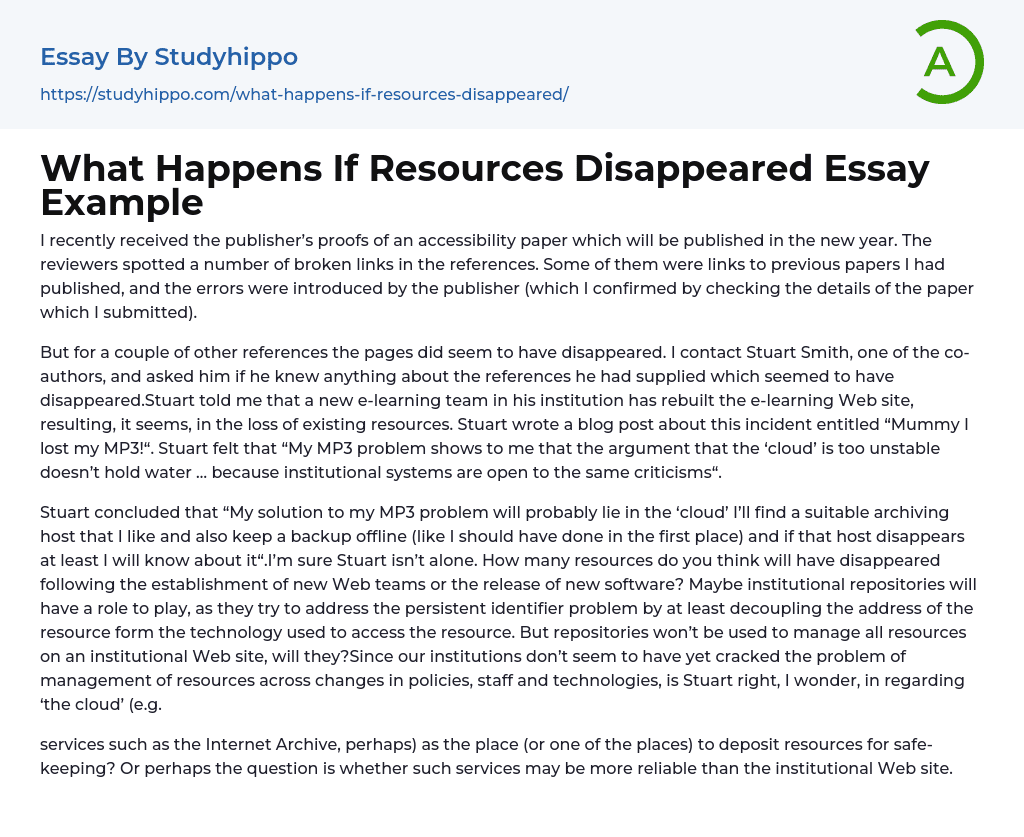I recently received the publisher’s proofs of an accessibility paper which will be published in the new year. The reviewers spotted a number of broken links in the references. Some of them were links to previous papers I had published, and the errors were introduced by the publisher (which I confirmed by checking the details of the paper which I submitted).
But for a couple of other references the pages did seem to have disappeared. I contact Stuart Smith, one of the co-authors, and asked him if he knew anything about the references he had supplied which seemed to have disappeared.Stuart told me that a new e-learning team in his institution has rebuilt the e-learning Web site, resulting, it seems, in the loss of existing resources. Stuart wrote a blog post about this incident entitled “Mummy I los
...t my MP3!“. Stuart felt that “My MP3 problem shows to me that the argument that the ‘cloud’ is too unstable doesn’t hold water … because institutional systems are open to the same criticisms“.
Stuart concluded that “My solution to my MP3 problem will probably lie in the ‘cloud’ I’ll find a suitable archiving host that I like and also keep a backup offline (like I should have done in the first place) and if that host disappears at least I will know about it“.I’m sure Stuart isn’t alone. How many resources do you think will have disappeared following the establishment of new Web teams or the release of new software? Maybe institutional repositories will have a role to play, as they try to address the persistent identifier problem by at least decoupling the address of the resourc
form the technology used to access the resource. But repositories won’t be used to manage all resources on an institutional Web site, will they?Since our institutions don’t seem to have yet cracked the problem of management of resources across changes in policies, staff and technologies, is Stuart right, I wonder, in regarding ‘the cloud’ (e.g.
services such as the Internet Archive, perhaps) as the place (or one of the places) to deposit resources for safe-keeping? Or perhaps the question is whether such services may be more reliable than the institutional Web site.
- Email essays
- Hypertext Transfer Protocol essays
- Marshall Mcluhan essays
- Virtual Learning Environment essays
- Web Search essays
- Etiquette essays
- Mainstream essays
- Vodafone essays
- Web Search Engine essays
- Fuel essays
- Metals essays
- Oil essays
- Coal essays
- biofuel essays
- Steel essays
- Gasoline essays
- Petroleum essays
- Cloud Computing essays
- Computer Science essays
- Consumer Electronics essays
- Data Analysis essays
- Electronics essays
- engineering essays
- Enterprise Technology essays
- Hardware essays
- Impact of Technology essays
- Information Age essays
- Information Technology essays
- Modern Technology essays
- Operating Systems essays
- people search essays
- Robot essays
- Android essays
- Application Software essays
- Benchmark essays
- Computer Network essays
- Computer Programming essays
- Computer Security essays
- Computer Software essays
- Cryptography essays
- Data collection essays
- Data Mining essays
- Graphic Design essays
- Information Systems essays
- Internet essays
- Network Security essays
- Website essays
- World Wide Web essays
- American Dream essays
- Barriers To Entry essays




